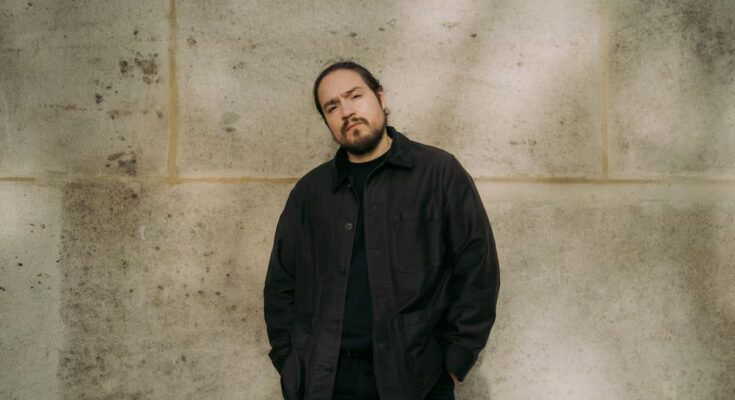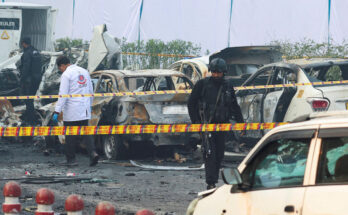Friendship is a strange feeling that is forged over years, but also in two and a half hours through extreme experiences. David Fritz Goeppinger (Pucón, Chile, 33 years old) met some of his best friends on the night of November 13, 2015 in a corridor of the Bataclan hall, where they were waiting for the entry of a police assault commando with a terrorist with an AK-47 and an explosive belt. Shortly before, he had spent ten long minutes hanging from a window of the concert hall building along with two other victims of what would be the largest terrorist attack in the history of France.
“I knew I couldn’t do anything else. And it was a good idea, because I’m alive. I started talking to the person next to me. With Sébastien, who today is a great friend. I asked him what his name was, I shook his hand and told him that everything would be fine. To this day he still asks me why I said that,” he explains to EL PAÍS in a bar near the Seine.
Fritz, the son of Chilean immigrants, a professional photographer and writer, went to see the Eagles of Death Metal that night, like the other 1,500 people who were in the room. But the concert was suddenly interrupted. In synchronized action between 9:20 p.m. on Friday and at 1.40am on Saturday, three nine-man commandos with automatic weapons and explosive belts killed 130 people and wounded 350; In the Bataclan 90 people lost their lives. On various terraces and restaurants from the 10th and 11th arrondissements of Paris, another 39. At the Stade de France, one more. The Islamic State (ISIS) terrorist group, which still controlled cities such as Raqa, Syria, or Mosul, Iraq, claimed responsibility for the attacks a few hours later. It was a response, they announced, to France’s participation in the international coalition bombing their positions in the two Arab countries.
He didn’t know the reason. But I could imagine it. During the hostage-taking, one of the kidnappers asked him his opinion on François Hollande, then President of the Republic. The matter was not innocent. The terrorists attributed France’s participation in that military coalition in Syria to him. And he refused to talk, claiming to be Chilean. “I was afraid and I went back to my origins. It was a way to protect myself, I didn’t lie. But I grew up in France, I went to school here, I speak French… but I told him that I was Chilean. It was like telling him that he wouldn’t come with me. That’s why, after the Bataclan, I needed to obtain French nationality, to reconcile with a part of my personality.”
Fritz was working as a waiter at that time. He had organized his life. But when the first chords of Kiss the deviIt broke into 1,000 pieces. And the worst thing is that he couldn’t receive comfort from the people who loved him. “I spent seven years seeing a psychologist who worked with the BIS (the special assault unit of the police). She knew the topic of terrorism very well and knew the symptoms it causes, such as post-traumatic stress: hypervigilance, anxiety, insomnia… You know? I still register everything I see and hear unconsciously.”
You can remember everything minute by minute. The entrance into the room, the first shots, the faces of the people, the moment he was left hanging from the ledge. The smells, the conversations, the extreme fear. “But what remains above all is not the taking of the hostages, but the moment of going out into the corridor. I thought everything had happened, but when we went down to the first floor I saw almost 90 people dead in the ditch. This is what remains, the terrible image that destroys everything inside you. And there the worst wound opens, which is the survivor’s guilt.”
Fritz is part of that club that none of his members would like to be part of, as he often says. I was 23 years old then. And the passion for music, for a certain type of music, which, in part, acted as a common thread with his new friends. A group of 12 people who were given a name potatoes: the contraction between pot (friend) e otage (hostage). His story, on how to learn to live afterwards, was told by himself in two books: Un day in our streets (One day in our life, Pigmalione publishing house) e The failure of life (You had to live, Leduc). But it is also the key to returning Des Vivants a fabulous series that just aired on France TV and in which he participated as an advisor. “It tells us what happened very well. But the most important thing is not so much what happened, but what it caused in us. What happens in the life of a victim when he emerges from an attack: his social, working, sexual life… You never think that anxiety, post-traumatic stress, will emerge at any moment.”
THE potatoes They survived, but went through an emotional ordeal that found relief only in psychiatric consultations and sharing their story with each other. “You lose the ability to speak and tell stories. That’s why I wrote this book and the previous one. I could talk to my psychologist and little else. That’s why when I started meeting the other victims I was able to do it. It’s a sincere solidarity, it’s something supernatural. Before I had one birthday, now I’m having two. And I share it with all those people.”
Memories accumulate, but they almost always have as their backdrop the room in which everything happened. Should I have locked the room? “It was difficult. They opened 364 days after the attack. For me, the Bataclan was mine. It didn’t seem possible to me that it would return to normal. But over time I understood that the hall already existed before and had to exist after. What I can’t, unlike other colleagues, is go to see a concert again. But it seems beautiful to me and I’m happy that other people can go there. Otherwise they would destroy the place and history would be forgotten.”
A large tribute will be held in the center of Paris on Thursday, presided over by the victims and the President of the Republic Emmanuel Macron. The process helped heal some wounds. But 10 years later the time has come to do it definitively. “The experimentation in the trial had an effect. Justice responded. And I, as a victim, stopped being useful. My word was useful. Then came the rubble. And from there we had to rebuild, go back to the psychologist. My idea now is to be a retired victim. Being a victim is not a job, so we have to overcome that phase.”



